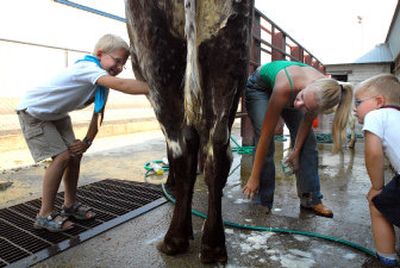Fair judges scrutinize entries

Friday was judgment day for hundreds of folks competing in the Spokane County Interstate Fair.
Hundreds of ribbons were on display on the fair’s opening day for the biggest gourds, tastiest chocolates and most intricate quilts, among dozens of other categories.
“If you win here, you’re well-recognized,” said Garrett Linstrum, a 17-year-old from near Davenport, who brought two heifers and a steer to the fair. A grand champion ribbon in his competition would translate to a much higher sale price at auction.
Numbers haven’t yet been compiled for the 2006 fair, but last year 2,121 people were awarded 14,024 ribbons. Every entry at least gets a participation ribbon.
Most entries like vegetables and crafts had been examined by Friday morning. Animal judging started Friday but will continue throughout the fair.
People aren’t just competing for pride.
Those who get first-, second- or third-place honors also get money ranging from about $1 to roughly $100, depending on the event and other factors, said Jessie McLaughlin, fair coordinator. About $100,000 will be awarded this year.
Nutritionist Helen Samsel has been judging food at the fair since 1953. On Friday she examined pies, yeast breads and chocolate.
Food is reviewed on more than taste, she said: “We eat with our eyes.”
She also touches pie crusts for flakiness and takes a bite or two of each entry.
“You can give six women a recipe, and you’re going to come out with six different products,” she said.
Despite tasting dozens of entries, food judges don’t gorge themselves.
On Friday, Samsel ate breakfast, spent four hours or so judging and was hungry enough to have lunch when she was done.
Will Wolf, who was preparing to judge cattle Friday evening, said competition helps increase quality throughout the industry.
Folks who don’t do well at the fair will learn from those around them how to raise more quality animals for next year, Wolf said.
“It’s a good place to compare and see what you’re neighbor has,” Wolf said.